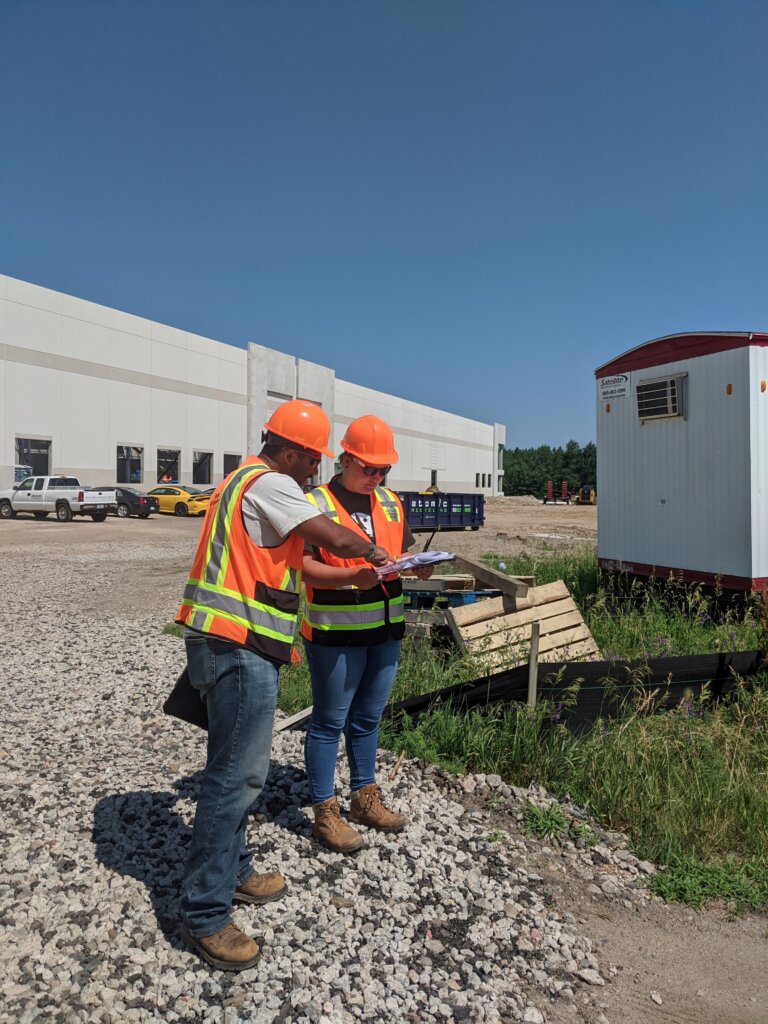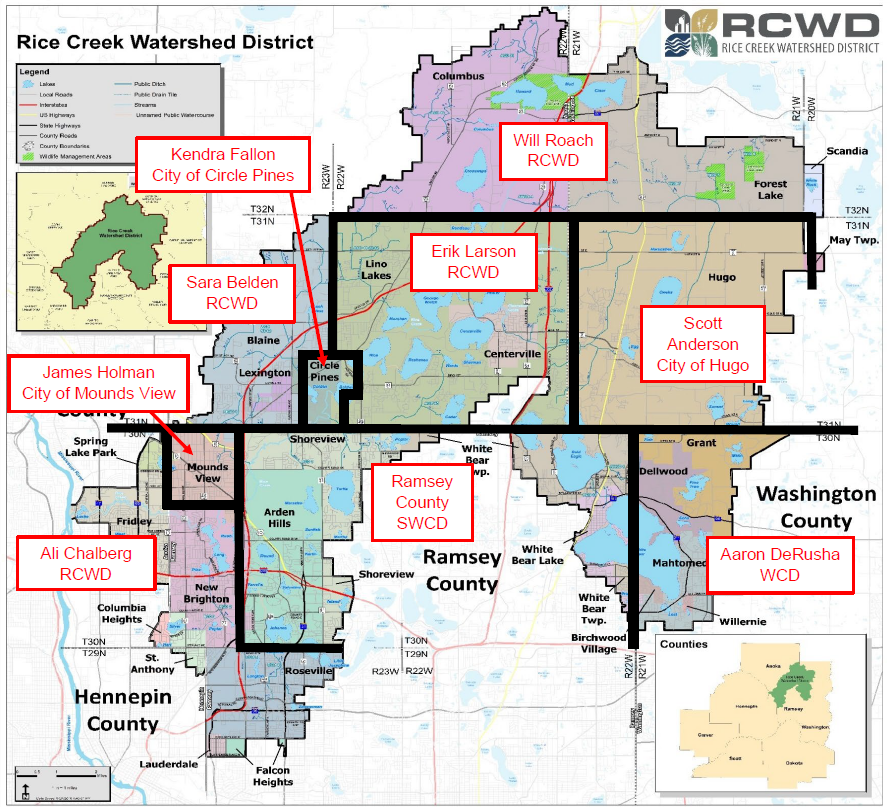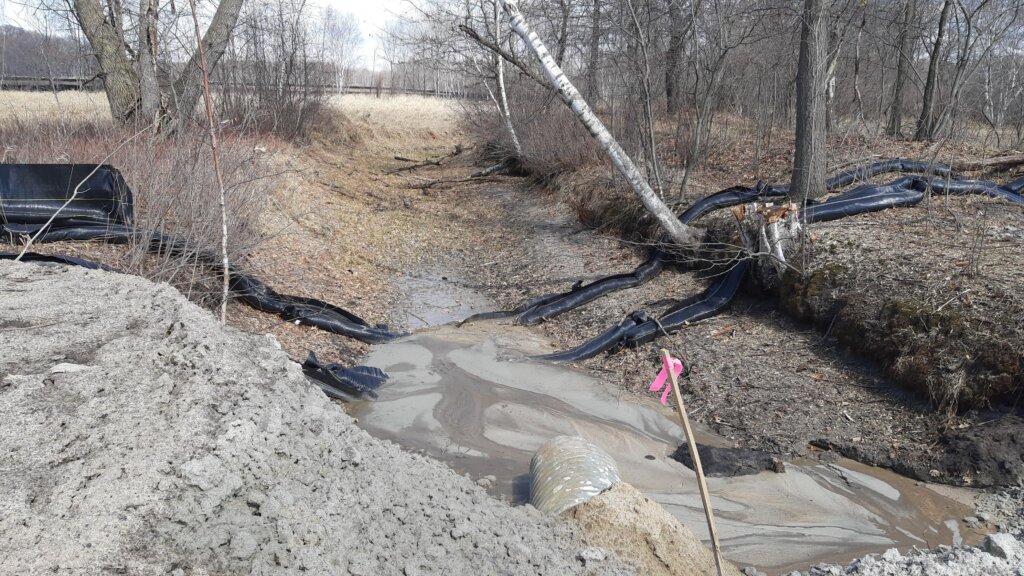Inspections
The RCWD inspection program works hand-in-hand with other regulatory programs to protect water quality, prevent runoff, and reduce flooding.
Staff inspect permitted construction projects to ensure construction is consistent with the approved plans, that permit special stipulations are being completed, and to review sediment & erosion control measures during active construction.

Inspectors
Once a permit has been issued, each project will be assigned a permit inspector. RCWD inspectors visit active construction sites and also investigate complaints regarding projects within the District.
Why is an Inspector Visiting My Site?
- Because a site has an open permit (routine inspection)
- To review a constructed stormwater feature
- To review wetland impacts
- To review active dewatering activities
- A concern or complaint has been received
What Are Inspectors Looking For?
If issues are observed during site inspections, staff will look to discuss with onsite personnel and provide possible solutions.
Below are common erosion and sediment control issues that are observed:
- Soil Stabilization
- Sediment control practices (Best Management Practices (BMPs))
- Conduct sediment control BMP maintenance if in a non-functional state
- Ensure functional redundant sediment control BMPs are adjacent to lakes, wetlands, ditches, and stormwater basins/pounds
- Inlet protection BMPs
- Construction entrance BMPs
Best Management Practices or BMPs are a set of guidelines and strategies designed to mitigate environmental impacts and promote responsible resource management in various fields, including agriculture, construction, and land development. Visit the Best Management Practices and Maintenance page to learn more.
The Minnesota Pollution Control Agency (MPCA) has information for stormwater pollution prevention on small residential construction sites. Click here to visit their webpage: MPCA
What Happens if an Inspector Has a Concern?
Not all issues that inspectors find are immediately identified as a violation. RCWD inspectors will work with permit holders and contractors when changes are needed to improve, maintain, or install best management practices or meet permit requirements.
Inspectors will list the areas needing improvement when they find construction site erosion and sediment control BMP (best management practices) issues. The information will be included in the inspection report with a deadline for required maintenance, installation, or other required actions.
Contact Your Inspector
Before you contact an inspector, please refer to the map to determine who is responsible for inspections in your city.




Aaron DeRusha

Permit Expiration, Transfers, and Closures
Expired or Going to be Expired Permits
RCWD issued permits are typically valid for 18-month periods unless stated otherwise within the permit.
During the first permit renewal/extension, a permit will not be subject to any changes in District rules.
To request a permit extension, contact your RCWD inspector in writing, stating the reasons for the extension. If there are any plan changes or updated project documents, also include them in your permit extension request.
Transferring Permits to Another Party/Person
Permits can be transferred to another responsible party by submitting a Permit Assignment Form (form is available below in Resource section) for review and approval by RCWD.
This form is used to transfer the responsibilities of an open RCWD permit to another party without reapplying for permit coverage. When surety is involved for a permitted project, please note that replacement surety and a new escrow agreement will be required for a permit transfer.
Permit Close Out and Surety
Erosion & sediment control measures must be maintained until final vegetation and ground cover is established to a density of 70%. Once this occurs, temporary erosion and sediment control measures must be removed.
All permit stipulations listed on the permit and required monitoring of wetland mitigation areas must be complete prior to permit closure.
If permanent stabilization has been achieved for your site, notify the District that the project is complete. District inspectors will inspect the project to determine if it was constructed in accordance with the terms of the permit and District Rules.
All stormwater features must function as designed in accordance to the specifications called out in the permit’s Engineering Report.
Once a District inspector determines all special stipulations have been completed, vegetation establishment has been achieved (density of 70% coverage), and all remaining temporary sediment control BMPs have been removed a final closure inspection report or notice will be sent to the applicant stating the permit will be closed. The District will release the bond or letter of credit (if applicable) and return the cash surety within approximately 3-6 weeks.
As-Builts Surveys
What is an as-built survey?
An as-built survey is a survey showing post-construction information for comparison to the approved plan. An as-built survey is typically required for permanent stormwater Best Management Practices (BMPs), wetland impact/mitigation areas, and floodplain impact/mitigation areas.
RCWD does not perform as-built surveys.
Contact a surveyor or other consulting company with surveying capabilities.
All surveys must be in NAVD 88 and certified by a Minnesota registered land surveyor or engineer.
Will my permit require an as-built survey?
If your proposed project has any permanent stormwater features, public drainage system alterations, waterbody crossings, wetland impacts, or floodplain alterations it is likely that an as-built survey will be required.
Review your issued permit, inspector introduction letter, or contact your inspector to determine if an as-built survey is required.
Complaints and Violations

Individuals with concerns, complaints, or questions regarding a permitted or suspected unpermitted project, please contact an inspection staff member (internal link to employee directory page) via email or phone. Please provide an address or property ID number (PID) and any relevant information to the concern.
Sometimes staff will receive calls from individuals with a concern or complaint. Each concern is investigated when it is received.
Resources
Inspector Area Map Updated 6_14_2024
Map of Inspectors in the Rice Creek Watershed District
Learn MoreAs-built Guidance Document
Standard requirements for as-built plans submitted as a condition of a RCWD permit
Learn MorePermit Fee and Surety Fee Schedules
RCWD Permit Fee and Surety Fee Schedules for permit applicants
Learn More